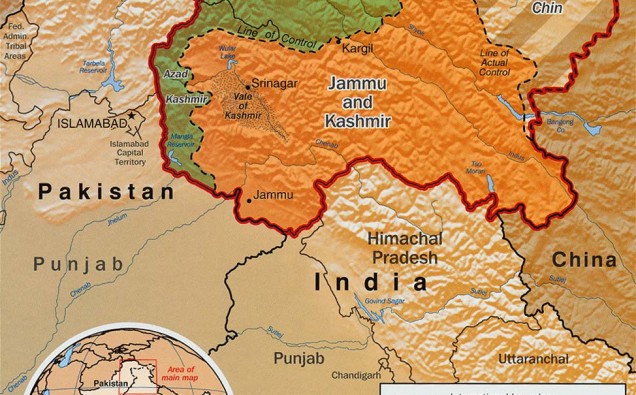
The United Nations continues to adhere to its well-established position on the Jammu and Kashmir dispute, Secretary-General Antony Guterres’ spokesman said about the thorny issue that has been at the center of tensions between nuclear powers India and Pakistan for the last seven decades.
The outstanding issue attracted attention at the world’s largest diplomatic forum when India assumed the presidency of the UN Security Council for the month of August.
Indian Ambassador to the U.N., T.S. Tirumurti reiterated New Delhi’s claim that Jammu and Kashmir was an “integral and inalienable” part of India – a contention which Pakistan’s Permanent Representative rejected.
“I think it’s important to recognize that the issues relating to the Union Territory of Jammu and Kashmir are internal affairs of India,” Ambassador Tirumurti said.
The Indian claim to Jammu and Kashmir as India’s part was made by the country’s Ambassador T.S. Tirumurti, at a press conference on Monday. In a swift rejoinder, Pakistan’s Ambassador Munir Akram said, “Jammu and Kashmir is an UN-recognized disputed territory and NOT an ‘integral part of India’.”
Within hours Pakistan’s Ambassador Munir Akram dismissed India’s claim that Jammu and Kashmir was its integral part,
“Jammu and Kashmir is an UN-recognized disputed territory and not an ‘integral part of India’,” Ambassador Akram said in a sharp rejoinder.
After the spat between the two South Asian neighbors, a journalist raised the issue, asking Tuesday the UN Secretary-General’s Spokesman, Stephane Dujarricabout about the world body’s stand on Kashmir.
“Our position on Kashmir is well-established and has not changed,” he said.
Kashmir has been on the UN agenda since India took it to the forum soon after India and Pakistan fought over its status following their 1947 independence from the British colonial rule of the subcontinent.
The UN Security Council has passed resolutions on several occasions regarding the need for a peaceful settlement of the dispute. Kashmir is a Himalayan territory with a majority Muslim population and also holds an immense strategic location for the region.
In response to another question, the UN spokesman also referred to the Security Council resolutions on the dispute.
“You will find it in relevant resolutions. I’m not going to go and repeat it, but ours (position) is unchanged.”
Pakistan and India which both control parts of Kashmir have fought several wars and skirmishes over it.
The South Asian tensions particularly soared after New Delhi unilaterally changed the constitutional status of Jammu and Kashmir through an act of Parliament on August 5, 2019. India also imposed a lockdown in the valley and drew widespread condemnation for its denial of basic democratic rights to people and arbitrary detention of young people.
The decision did away with the constitutionally guaranteed autonomy to Kashmir, which retained its autonomous governance for decades.
The United States has urged India and Pakistan to hold talks on the dispute. Washington has important relations with both countries and tries to follow a diplomatic balance on the issue.
President Biden, during his election campaign, had called for respect for human rights in the disputed territory.
Since the August 5, 2019 decision to abrogate the autonomy of the Indian-controlled Kashmir, Pakistan prime minister Imran Khan has criticized his Indian counterpart Narendra Modi for following an ultranationalist agenda that seeks domination of the majority Hindu population.














